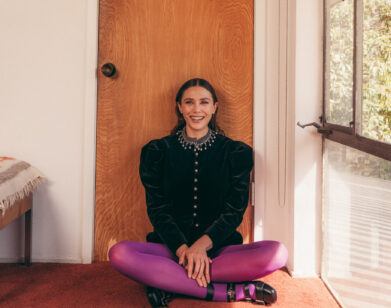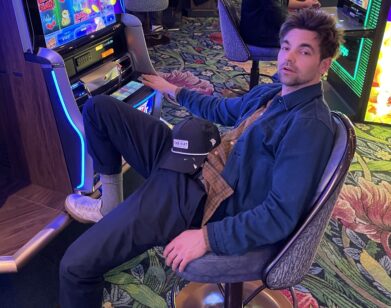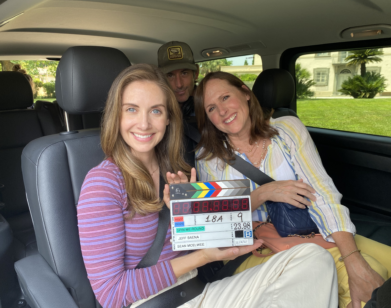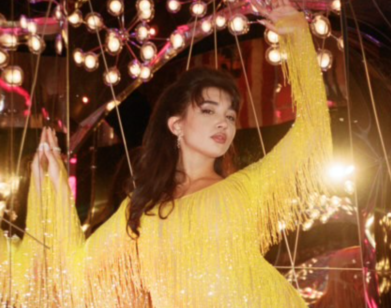drumroll, please
Joe Wong and Fred Armisen March to the Beat of Their Own Drum
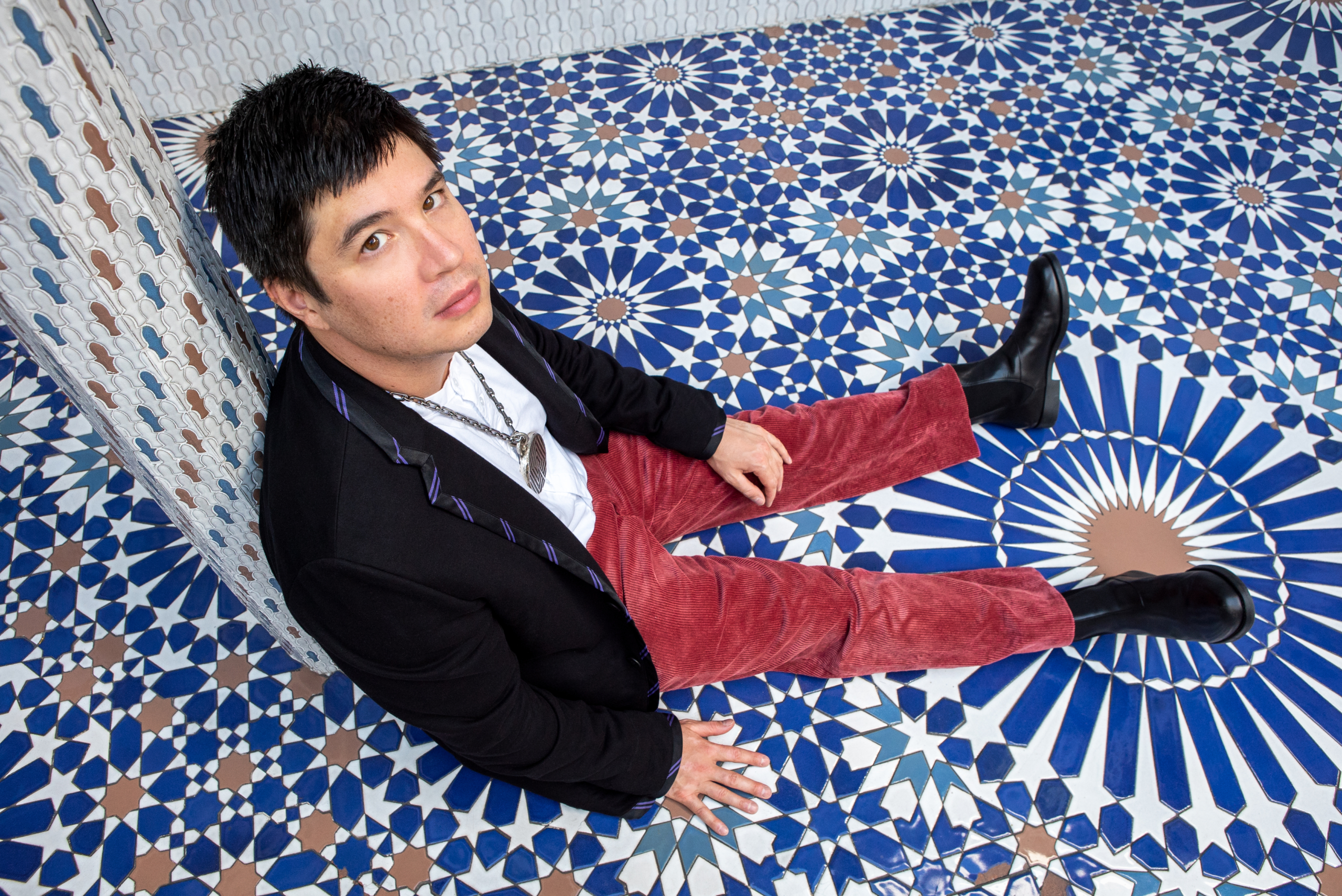
Photo by Priscilla C. Scott.
Nobody thinks about the drummer. Well, the drummer thinks about the drummer, and if anyone thinks about the drummer, it’s Joe Wong. The musician and composer for fan-favorite streaming series—Russian Doll, Master of None, and The Midnight Gospel among them—Wong has handed over the mic to the most quietly explosive members of the band with his podcast The Trap Set, in which he interviews drummers like Sheila E. and Chad Smith of the Red Hot Chili Peppers. But with his debut album, Nite Creatures, Wong has stepped center stage as the songwriter and vocalist for ten deeply personal, acid-tinged tracks accompanied by a 24-piece orchestra.
When thinking about drummers, especially those tapped into Hollywood, it would be a travesty to ignore Fred Armisen, the offbeat actor and Saturday Night Live phenom. Before satirizing the punk patrons of Portlandia, Armisen was one himself as the drummer for the band Trenchmouth and a background drummer for Blue Man Group. As the current bandleader and frequent drummer of the 8G Band, the house band for The Late Show with Seth Meyers, Armisen has found a way to build upon his comedy career while still banging on the drum all day. It was a match made in percussion heaven when Armisen met Wong. Wong went on to produce Armisen’s Netflix special, Standup for Drummers, while Armisen directed the music video for the title track on Wong’s album, “Nite Creatures.” On a spotty Zoom call across Los Angeles ahead of the record’s release, Armisen passed the mic to Wong. (Well, sort of.) —SARAH NECHAMKIN
———
FRED ARMISEN: Hi, my name is Fred Armisen. I’m interviewing Joe Wong.
WONG: How’s it going?
ARMISEN: It’s going good. I’m very happy to be talking to you. We’ve known each other, I’m going to say, a long time, now.
WONG: Well, I think the first time that I’d met you, you were still primarily playing drums in the band Trenchmouth in Chicago at Fireside Bowl in, like, 1996. But we kind of reconnected when I was playing in Marnie Stern’s band. That’s when I got to see you again.
ARMISEN: Aside from being friends with you, I was immediately a fan of The Trap Set, your podcast that’s about drummers. I love it so much because there’s no drumming on it. People aren’t just showing you their chops, and you’re such a good interviewer.
WONG: Thanks a lot. Did you know that the first interview was conceived when you invited Marnie’s band backstage to SNL for a taping and Brendan Canty [of Fugazi] was there? He was the first person I interviewed for the show. I was going through a rough time in my life, and I was like, “Brendan has all the answers,” because he just seemed so cool. At the after-party, I cornered him and talked to him for like, four hours, and then decided that we should make it into a podcast.
ARMISEN: But did you have an inkling at all that you would be good at it?
WONG: Well, when I was on tour at that time, I would listen to lots of podcasts because I was kind of burnt out on hearing music from playing every night. When I would listen to people like Marc Maron or Terry Gross, I did think, “Oh, maybe I could do that.” I just felt like I would think of questions that sometimes they wouldn’t think of, and I was like, “I want to try that.”
ARMISEN: And, what made you decide to do the interview where it’s only questions and answers and no physical drumming?
WONG: Because I think that that’s more revealing as far as who somebody is as an artist. Maybe you can analyze what somebody’s technically doing, but unless you understand how they got there, it’s kind of pointless. It’s kind of like, anybody can read Shakespeare aloud. But unless you understand the emotion behind it and whatever the actor is putting into it, you can’t be a Shakespearean actor. So, I was trying to understand where people were coming from. And, to be honest, I was going through a rough time in my life, so I was basically asking musicians that I loved how they navigated through life to try to figure out if it would be helpful to me personally.
ARMISEN: And, even though you’re a drummer, even though it seems obvious that you would pick drummers only, why did you pick drummers, only?
WONG: I felt like it was an untapped resource. Everybody wants to talk to the singer. When I had Brendan on for the first episode, he was telling me about how he would be talking to somebody from the audience. And then, the minute Ian [MacKaye] or Guy [Picciotto] would walk into the room, everybody would abandon him and talk to those guys instead. So, I felt like there were more untold stories.
ARMISEN: When you’re talking to them, you’re very fair and measured, and you really seem like a really good listener. What’s going through your head? Are you really listening, or are you thinking, “Okay, what’s my next question?”
WONG: I think I’m trying to just be in the moment and not think of the next question. Sometimes, I will think of a question to ask next or another place that I want to go, but I’ll try to keep that in the back of my head and go there if there’s a break. Someone once told me that a good interviewer will let the person that they’re interviewing talk seven times as much as they talk, at least. So I try to let the other person talk seven to 10 times as much as me, roughly.
ARMISEN: Well, that would be if your goal is to be a good interviewer. I have a goal of being a bad interviewer because, at least then, there’s some characterization to how I do it. So, I’m going to try to talk seven times more than you.
WONG: Okay, let’s go.
ARMISEN: Is there anything that you think that drummers have in common?
WONG: I think that drummers are the most empathetic members of a band. They’re primarily there to elevate someone else’s songs. They’re an accompanist. They’re not the focal point, usually. And I think they’re really good at reading other people’s emotions and knowing how to respond, musically. But I think it extends to interpersonally, too. I think they also are the most under-appreciated members of the band. A band can easily kick out a drummer and replace him or her without a marked decline in ticket sales, but you can’t necessarily do that with a singer, except in a couple rare instances.
ARMISEN: Strangely, usually, I’m against it. I’ll think, “No, I want to see the original members.” But then, when they come around and it’s time to buy a ticket, it kind of goes out the window. What do you think drummers are happiest about? What is their biggest pride?
WONG: They get to play the most exciting instrument. It’s the most visually exciting, the loudest. So, there’s this duality where, on the one hand, like I said, they’re not the focal point. But, on the other hand, they’re playing the most aggressive, loud, ostentatious instrument in existence.
ARMISEN: Oh, it’s the best. At the risk of sounding pretentious, it looks like a sculpture. I love what the drum kit looks like. The symmetry, the cylinders.
WONG: I know. I think it’s kind of a meditative exercise to set up a drum set and do it in a specific way. As I remember, when we did your drummers-only show, you still set up lots of the gear yourself. So, when I was playing this show back in November, it was the first time I’d been a lead singer in a band, and I just kept wanting to set up the drums. But Matt Cameron was playing drums, and so I didn’t have anything to do, and it was really weird not having anything to do with my hands or not have any gear to carry in before the show. It was really disconcerting, actually.
ARMISEN: It is meditative. I think the only weird downside to setting up drums is, when you take them apart and put each drum in the case, they somehow don’t always fit in that easily. There’s always some negotiation where you’re trying to get that kick drum into that bag.
WONG: I have a question for you. When I first interviewed you for my podcast, you told me that spiritually, you still feel like a drummer. Is that still true?
ARMISEN: Absolutely. That never left me. Approaching sketches on SNL, Portlandia, doing standup, it feels very much like I’m a drummer doing these things. I still want to be the drummer in the sketch.
WONG: What does that mean to you?
ARMISEN: Being a drummer is not being the main guy, which I love. It’s supporting the rest of the people in the sketch, but still having an instrument that is spectacular, playing something that looks great and draws attention in the sketch. Every time I’ve ever walked onto a stage in comedy, I’ve always felt like a drummer.
WONG: Lots of the films that you’ve been in, you’re a drummer. You’re not necessarily the lead in all of them. When you were doing Standup For Drummers, which I helped produce, that was the most vulnerable I’ve ever seen you in front of people. You were offering more about yourself as a person than I’ve ever seen before. Do you think that’s accurate and did that feel comfortable?
ARMISEN: Definitely, and yes, it was perfectly fine. I didn’t mind that part of it. The only reason it happened is just because Netflix needed an hour of material. It’s almost like I ran out of stuff and I was like, “Well, I guess I’ll tell some of my John Waters personal story kind of thing.” It wasn’t like, “Now’s my opportunity to be the real me.” It was more like, “Ugh, we need an hour. I can’t keep playing drum kits for this long.”
WONG: That’s so interesting because the record that I made, I started making it right around the time that I was helping you with your special, and it was definitely inspiring to see that personal side of you. At the same time, I was also scoring Russian Doll, and that was an extremely personal statement on Natasha [Lyonne]‘s part. Watching both of you make these really personal artistic statements was partially what pushed me to make my own record.
ARMISEN: Well, that’s very kind of you. I’m just going to guess that you would have found your way to it anyway.
WONG: You’re probably right. But there was something about seeing other people who I respected make things that I liked, seeing them really going for it and being hard on themselves—eventually they got to a place where they made something really personal, but also universal and great. Seeing someone else go through that struggle was really inspiring.
ARMISEN: Do you think you were hard on yourself making this album?
WONG: I tried to make other albums dating back decades and I would always throw them away because I was too hard on myself. And then, when I started making this album, I realized that, that year, I had written maybe 200 hours of music for film and TV, something crazy like that. I was like, “How come I can write so much for other people, but I can’t make something for myself?” I think part of the answer is that it’s harder to open up, for me. But, what I realized is if I have barely enough time and I’m working to a deadline, then I can get stuff done. If I have too much time, then I overthink it. So I booked another studio so that there would be a finite amount of time that we could make this album. And then, when I did that, it worked.
ARMISEN: Finding a location where you don’t usually work is such a good secret ingredient, I think, to making something great: another location, another studio, another city. For some reason, it helps put you in another mindset.
WONG: Yeah. I was always really hard on myself as a drummer, too. I would be like, “Well, the gold standard is this person or that person.” I would hold myself up against the greatest people that had ever done it and then beat myself up over it. That’s just an extension of ego, and it’s not helpful.
ARMISEN: Yeah, don’t do that. You’re a good drummer.
WONG: I think that I’m finding that same sensation as a singer. I’m not trying to be the best singer in the world. I’m not trying to be as good as anybody else. I’m using it as a vehicle to discover what I can do. That’s another thing I’ve noticed with all the people that I’ve interviewed over the years, Fred—lots of the drummers are really hard on themselves. I think that’s probably why lots of them are so great. But, I think after a certain point, you have to start treating yourself like you would treat a friend, or somebody that you were coaching to get better. That’s what I try to do these days.
ARMISEN: It shows. I love that you reinvented yourself, that you were like, “I’m going to be the singer.” Which song convinced you that you were on the right track?
WONG: The title track, “Nite Creatures,” was the first one that I had. It was actually after that first song that I knew, “Okay, I can do this 10 more times.” I was trying to figure out what my voice was, not just my singing voice, but my creative voice. With scoring, I can work in any style. It’s almost like what you do with impressions. But this was more about making a personal statement. Once I started figuring out what felt natural to me as a person, then it sped up really quickly.
ARMISEN: How did you know you could write lyrics?
WONG: I didn’t. I’d written lyrics for shows and movies for songs that characters sing on camera. But, again, that’s easier in the sense that you’re writing for someone else’s voice. I don’t know. I just did it. I would set a timer for 10 minutes and then try to write a first pass of the song. I found that if I made it into a game where I only had a certain amount of time, then I could be more creative, somehow.
ARMISEN: Sometimes, when I’m doing a sketch, I picture myself as somebody else just to help me through it. I’ll think, “Okay, I’m Molly Shannon in this sketch. That’s the energy I’m going to have.” As a singer, do you picture somebody in your mind?
WONG: When I first started, I had to because I was so terrified. Just being in the studio with Mary and doing my first vocal pass was pretty much the scariest thing I ever tried creatively. It was intensely scary in my body. I was sweating, and my face was all flushed and stuff. When I was doing that, I was trying to channel great singers that I love like Scott Walker or Kate Bush or Lou Reed. But the more I started figuring out what the lyrics were and what the songs were all about, then I felt more confident just being myself and going on this adventure of trying to figure out what my singing voice was all about. It was fun because I’ve been playing drums for 30 years or something, and it’s really hard to make even small incremental progress right now. But, since I had no experience as a singer, I could make big leaps from one day to the next.
ARMISEN: You performed at Hollywood Forever Cemetery. It was a beautiful show. The stage was packed with people and the audience was packed. Is that the only show you’ve done for this album?
WONG: Yeah. I had a tour booked for May, and another one booked for October. Unfortunately, those are postponed due to COVID, but after I played that show, it became clear to me that that’s what I wanted to be doing with my life.
ARMISEN: What’s your memory of being onstage?
WONG: I got really, really nervous before I went on. When I first went out to sing, I had to kind of catch my breath because my heart was pumping really fast. But, then I remember it feeling great. I think somewhere along the line through working as a professional musician, I had gotten disconnected from that intensity of feeling that you get when you’re playing music for the first time with your friends as a kid and I got it back. What I remember the most is the feeling. My brain shut off to the extent that good friends of mine came up and talked to me afterwards and I didn’t recognize them and I have no memory of having any conversation with them.
ARMISEN: I think I read somewhere that the best shows are just a blur in your memory. You don’t even remember the specifics because it was so good.
WONG: When I first started playing in clubs, I was 14, and I remember feeling so nervous like that. But somewhere along the line, I just got competent enough where I could lean back on muscle memory if I had to, so I haven’t felt that nervous in the last 20 years. Do you ever get that nervous anymore?
ARMISEN: Not really. I think I just enjoy it doing standup and sketches and stuff. The nervousness I would feel on SNL would be just a matter of hitting the right marks. Sometimes, if I’m doing a movie or a TV show where I have to memorize a lot of lines, I’ll have a feeling of, “Oh, God, I hope I remember all these lines.” But then, the way I talk myself out of feeling bad about being scared is I just say, “Okay, well, then, this character is a little scared. This character is scared to talk in this room. Maybe that’s part of what he’s like.” By the way, I’m so sorry if I sound like I’m giving acting classes, but—
WONG: No, I like it.
ARMISEN: That’s the way I’ve sort of talked my way through scenes if I worry about memorizing lines.
WONG: I know you’re a big fan of her and a friend of, too, so, I bring her name up: Sheila E. When she was on the podcast, she was telling me that her whole compass is based on that nervous feeling. She’s always trying to find the next thing that will scare her out of resting on her laurels, and I thought that was so cool. She’s like, “You know that feeling where you have butterflies? Think about a time when you were performing for the first time or whatever. Think about how it felt in your body. That’s what I’m trying to feel all the time.”
ARMISEN: Oh, I love it! Dammit, I wish I’d come up with that. Sheila E., I always just thought we should give her a Nobel Prize of timbales. It’s almost like a weird key to life, a key to performance. There’s nothing worse than someone who’s comfortable and having just a groovy time. I do this other weird thing—I think in my head, “Well, what if this performance, it’s not great?” So what? I’ve seen shows of bands that I love and it wasn’t great, and I loved it. So what if it’s a little rocky? I don’t mind. That’s the fun of being alive. It’s a little messy.
WONG: If I was hosting this, I would have said, “Well, that’s a good time to end it. Fred Armisen, thank you so much for being on the show.”
ARMISEN: But you’re not the host. Sorry, buddy.

